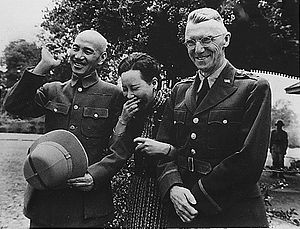It is no secret that the United States has long undertaken aggressive steps to manage the politics of other countries, even those with democratic governments. Until 2016, many Americans lived under the illusion that foreign countries do not return the favor, but, of course, many nations over the years have attempted to intervene in the functioning of the American political system.
Kristopher Erskine (reviewed here by T.J. Park, associate professor of History at West Virginia University and historian of the China Lobby) has undertaken a study of the establishment and operation of a pro-Nationalist propaganda network in the United States in the late 1930s. While previous work had demonstrated the existence, and to some extent the effectiveness, of these networks within the United States, Erskine makes clear that they were established as part of KMT policy. Erskine discusses detailed policy guidance from Chiang Kai-shek in 1938 to the American Committee for Non-Participation in Japanese Aggression (ACNPJA), a lobbying group in the United States.
This propaganda operation worked through pre-existing networks of American missionary groups, who remained fixated on the promise of Chiang Kai-shek as a Christian leader, and deeply concerned about both Communist and Japanese expansion. American commercial groups also took part. The ACNPJA took steps to obscure the role of the Chinese government, operating with an all-American board of directors and failing to register as a foreign lobbying organization.
As always, it is difficult to ferret out the precise impact of a propaganda campaign. Erskine suggests that, at a maximum, the campaign may have helped shape U.S. public opinion such that significant economic sanctions against Japan became possible. Park argues that it is impossible to know how much the ACNPJA shaped US attitudes, and that to some extent it built on pre-existing sympathies for China that would have inclined the United States toward sanctions against Japan anyway. To be sure, networks of anti-isolationist groups were active in the United States at the time, although even these had little affinity for Japan.
A different way of approaching this issue is to ask: “What is the difference between Americans advocating for China, and Americans advocating for China at the direct behest of the Chinese government?” That the ACNPJA apparently took concerted steps to look like the former rather than the latter implies that the difference is consequential. Failing to register as a foreign lobbying agent is, of course, rather different than conducting espionage and a high-profile media campaign against a specific candidate. We can file ACNPJA activities under something like a spectrum between “influence” and “interference.” Investigating Chinese influence prior to the war helps clarify how we think about “foreign influence” in the politics of the United States. It also seems worth noting that the U.S. political system reacted poorly to the idea that the People’s Republic of China had supported the re-election campaign of President Bill Clinton in 1996.
The last four years have been enlightening with respect to how American politics reacts to intervention by foreign actors, which has been common for much of the history of the Republic, but which has taken on a new character since 2016. A recent study published by Michael Tomz and Jessica Weeks (summarized in the Washington Post’s Monkey Cage) investigated U.S. attitudes toward foreign interference. It found that Americans were sensitive to foreign influence over elections, especially as the level of influence and interference escalated, but that voters were particularly angered by intervention of a partisan nature. As the internet renders finance and media more permeable than ever before, we will undoubtedly see further, more sophisticated, efforts on the part of foreign actors to manage American politics.

































